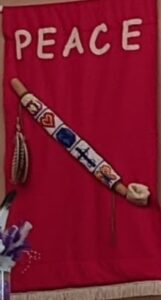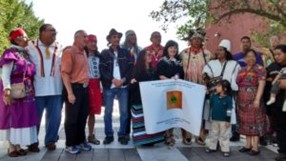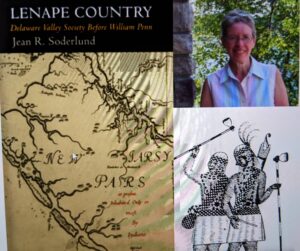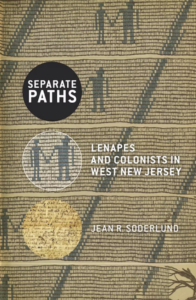SQ IAC MENU: Provenance / Love Thy Sovereign Nation Neighbor / Allyship / Call To Action
BEING ASCRIBED AN “ALLY” BY NATIVE NATIONS
According to Anne Bishop, “Allies are people who recognize the unearned privilege they receive from [their] society’s patterns of injustice and take responsibility for changing these patterns.” Using Bishop’s framework, one might self-ascribe to intra- ally relations – within a given group/ society/ governing.
However, allyship with a sovereign Native Nations might be framed as inter, or between, societies/ governances. An Indigenous (sovereign) Native Nation may, from the voice of leadership, initiate an invitation/ ascribe someone from “outside” the community as an ally. This relationship is viewed as mutually beneficial. Inter-societal non-native allies carry subsequent non-native rights and responsibilities toward maintaining this unique “allyship” with sovereign Peoples. The following voices of counsel call attention to potential duties, highlighting humility, community, integrity and love.
Allies cannot be self-defined. They must be claimed by the people they seek to ally with.
~Unsettling Minnesota
VIEWPOINTS: Non-Indigenous Rights & Responsibilities
Rev. J.R. Norwood, Ph. D. (Nanticoke Lenni-Lenape)
- Always wait for an invitation to participate in anything;
- know that the tribal community has total authority over its own identity, culture, traditions, policies, practices, ceremonies, and beliefs;
- when a tribal person avoids eye contact, becomes silent, or turns away (even slightly) when you are talking, it may be an indication that they are politely trying to end the conversation or that you have overstepped;
- traditional tribal values are adhered to at varying intensities from individual to individual;
- a tribal chief is a head of state. “Outsiders” should be mindful that even though they may know the tribal leaders, it does not mean they are entitled to the same type of interaction with them as the tribal people may have.
Nora “Touching Leaves” Thompson Dean (Lenape)
- DO NOT go to work among the Native Americans with the idea that you are doing them a favor. It will show through in your attitude;
- DO NOT refuse to go into a house if you have been invited to come in;
- It is an insult to refuse food among my people (unless you are allergic to it;)
- DO NOT interrupt when someone is answering your question;
- DO NOT refuse to attend any ceremonies if you are invited. If you have reasons why you cannot go, tell them;
- DO NOT take photos or make recordings without permission.
Cara Lee Blume, Ph.D. – non-native, anthropologist/ archeologist
- Paddle your own canoe, always remember you are NOT Native;
- be humble;
- be quiet.;
- be discreet;
- be polite, always remember that you are an outsider;
- be respectful of the culture;
- be patient – always remember that your priorities may not be those of the community;
- be grateful – never presume that you deserve acceptance.
Lynn Gehl Ph. D. (Algonquin Anishinaabe-kwe) – Ally Bill of Responsibilities
- Accept the responsibility of learning and reading more about their role as effective allies;
- do not take up the space and resources, physical and financial, of the oppressed group;
- reflect on and embrace their ignorance of the group’s oppression and always hold this ignorance in the forefront of their minds;
- are fully grounded in their own ancestral history and culture. Effective allies must sit in this knowledge with confidence and pride; otherwise the “wannabe syndrome” could merely undermine the Indigenous people’s efforts;
- do not act out of guilt, but rather out of a genuine interest in challenging the larger oppressive power structures.
Two Row Wampum Renewal Campaign – How to be an Ally to Indigenous Peoples
- Remember that all beings (animals and plants) are your relatives not your resources;
- read Native Authors; support Native craftspeople, businesses and events;
- learn about the people indigenous to wherever you are;
- read and promote the UN Declaration on the Rights of Indigenous Peoples;
- don’t co-opt Native cultures or ceremonies;
- live with gratitude and lightly on the earth;
- slow down and listen more than you talk;
- reach out to you Indigenous neighbors;
- learn about and reject the “Doctrine of Discovery;”
- question and resist stereotypes including team names and mascots;
- respect and support Indigenous sovereignty.
First Nations Development Institute
National Congress of American Indians
 GUIDELINES for those Seeking Healing Relations with Indigenous Peoples: Lessons from Scheyichbi
GUIDELINES for those Seeking Healing Relations with Indigenous Peoples: Lessons from Scheyichbi
This set of guidelines is fluid, intentionally open to Spiritual revelations. With humility, allies of local, sovereign Native Nations faithfully embrace lifeways of accompaniment toward lasting peace and friendship. We invite individuals and corporate structures to consider decolonizing acts that include, yet are not exhausted by the following:
- We accompany Federal/ State recognized Native Nations, and/ or those who are verifiably – (4) historic, inter-related, continuous, and self-governing – due Tribal Nation to Nation/ State relationships.
- We trust the sovereignty of tribal nations – each Native Nation’s total authority over its own identity, culture, and lifeways.
- We acknowledge divisive acts upon the “original people” of Lenapehoking, both those who have remained and those of the diaspora who are removed from their ancestral homeland.
- We refrain from interacting with indigenous citizens, particularly with heads of state (chiefs) in a familial/ intra-relations manner, mindful of being “outsiders.”
- We express sincere gratitude to tribal ancestors, chiefs, spiritual leaders, council members, elders, culture-bearers and youth for the shared use of their homeland.
- We reciprocate rightly ordered “obligatory” hospitality, agape, friendship, and peace.
- We listen and patiently process authentic indigenous voice(s) anew, with appreciation.
- We do not presume to be deserving of acceptance by self-defining; “Allies cannot be self-defined. They must be claimed by the people they seek to ally with.” ~Unsettling Minnesota
- We secure prior permissions before taking photographs or making recordings of events, finding that assumptions of forgiveness after the fact are dismissive of human/ cultural rights.
- We speak from one’s own experiences with care for the use of pronoun markers of identity; “outsiders” will always be on the outside and are not to speak for indigenous peoples.
- We speak of “others” as if they are in the room, for they may be present without one’s knowing.
- We commit to (re)educating ourselves on historic truths and cultivating decolonizing lifeways.
- We strive to be responsible in the use of space, resources, and the natural environment.
- We act out of concern for cultural lifeways holding domination and lack of human equity, rather than shame or guilt.
- We do not condone co-opting indigenous cultures, such as non-native people conducted indigenous ceremony, wearing regalia, replicating Indian Art design patterns and crafting of Tribal iconography.
Therefore, Salem Quarter Indian Affairs Committee is led to be forthright with affiliate host organizations, individuals, and corporate structures that fall away from these guidelines; seeking right relations holds expectations of compassion, compliance, and related responsibilities.
updated 8/5/2023
TRUTH SEEKER
Remarkable is New Jersey’s own Jean R. Soderlund, historian and Professor Emeritus of Lehigh University. Jean has authored many works, including Lenape Country: Delaware Valley Society Before William Penn and Separate Paths: Lenapes and Colonists in West New Jersey.
Provenance / Love Thy Sovereign Nation Neighbor / Allyship / Call To Action
Photographs used with permissions, artists ©, ALL RIGHTS RESERVED.


